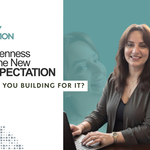
Openness Is the New Expectation. Are You Building for It?
July 15, 2025




I still remember that day. I wish I didn’t.
It was a client meeting. One of those important ones where you walk in prepared, confident, ready to lead the room. Except I wasn’t ready. My body had a different agenda that day.
Halfway through the conversation, I felt it creeping in. The heat. The fog. The pounding in my chest. The room was cold, but my skin was burning. I could feel the sweat building on. My brain was somewhere else entirely.
I smiled. I nodded. I made it through the motions. But I wasn’t present. Yet they noticed how uncomfortable I was getting.
That meeting? It didn’t go anywhere.
That client? Gone.
Not because of my work. Not because I wasn’t capable. But because I couldn’t control what my body was doing to me.
I drove home after that. Sat in the car for twenty minutes. Angry. Embarrassed. Tired in a way I can’t even describe. And when I walked through the door, I did what so many of us do. I took it out on the people who least deserved it.
Menopause tears you apart quietly.
It creeps into your work, your relationships, and your confidence. It messes with your mind when you need it sharpest. It drains you when you’re expected to lead. And worst of all? It isolates you.
Beyond The Pain
I’ve had days where I’m holding it together on Zoom, coaching a team member, and suddenly my eyes well up for no reason. I turn off the camera. I mute myself. I wipe my face. And I come back like nothing happened.
But something did happen. And it keeps happening.
This is menopause. It walks into boardrooms, sits quietly in meetings, follows you onto calls. And yet we don’t talk about it.
I’ve stayed quiet long enough. We all have.
Menopause belongs in workplace conversations. It belongs in policies, in leadership discussions, in the real, human side of business that so often gets ignored.
I’m done being silent on this harsh reality.
The Workplace Blind Spot
We’ve all heard the talk. How companies are creating inclusive workplaces. How mental health matters. How people should bring their whole selves to work.
But somehow, menopause never made it into that conversation.
It’s like this uninvited guest that visits every woman, but we’re expected to leave it outside the office door. As if that’s even possible.
I’ll say it plainly. Menopause follows you to work, into the meetings, into the deadlines and into your decisions.
The brain fog? It doesn’t care that you’ve got a client pitch.
The hot flashes? They show up whether you’re in a boardroom or a coffee shop.
The mood swings? You fight them off because you don’t want anyone to think you’re losing control.
The anxiety? It sits with you even when you’re doing your job well.
And the hardest part? Most people in the room have no idea. They don’t see it. They don’t feel it. They don’t even think about it.
Companies have made space for other conversations. Burnout. Mental health. Parental support. It’s progress. But menopause? It’s still this invisible thing. Often seen as private. Rarely discussed in professional spaces.
But it’s already in the space. It’s been here all along.
When we ignore it, we lose people; the good people. Experienced women who’ve spent years building their careers, their confidence, their teams. And suddenly they feel like they don’t belong. Like their body is betraying them and the workplace has no room for that reality.
That’s where we are right now. And honestly? That needs to change.
What Real Support Looks Like
This is simple. It’s about dignity. It’s about recognising that menopause shows up at work. Whether we talk about it or stay quiet, it’s already here.
Here’s what support actually looks like. Real, human, practical.
● Flexibility that works. A hard night. A tough morning. The space to reset without guilt.
● Sick leave that reflects real life. Menopause symptoms affect health and focus. Policies should reflect that.
● Leaders who understand. You don’t need medical knowledge. You need awareness, so leading with empathy comes naturally.
● Safe spaces that protect trust. When someone says, “Today feels heavy,” they still feel seen and respected.
● Programs that create awareness. Workshops. Quiet rooms. Menopause wellbeing sessions. Even small steps like providing menopause education through existing wellbeing programs, something several progressive companies have already introduced, can help women feel supported.
Workplaces already know how to create support. We’ve done it for parents. For mental health. For wellbeing.
It’s time to do it for this too.
The Silence Ends Here — And So Does the Inaction
To the HR leaders reading this.
To the founders.
To the company heads building workplace cultures.
This is your moment to take action.
Menopause belongs in your policies, in your leadership conversations, in your wellbeing programs. Women are showing up every day, leading teams, running businesses, delivering results — while carrying this in silence. It is time the workplace carried some of that responsibility too.
We are not asking for sympathy. We are asking for structure.
For conversations that happen without discomfort.
For programs that create real support.
For leaders who know how to respond.
Inspire is here to help you build that.
If you are ready to make your workplace stronger for the women who carry so much of it, let’s talk.
Call us at +971 50 770 2600
Learn more at www.weinspire.ae
It starts with one conversation. The rest follows.